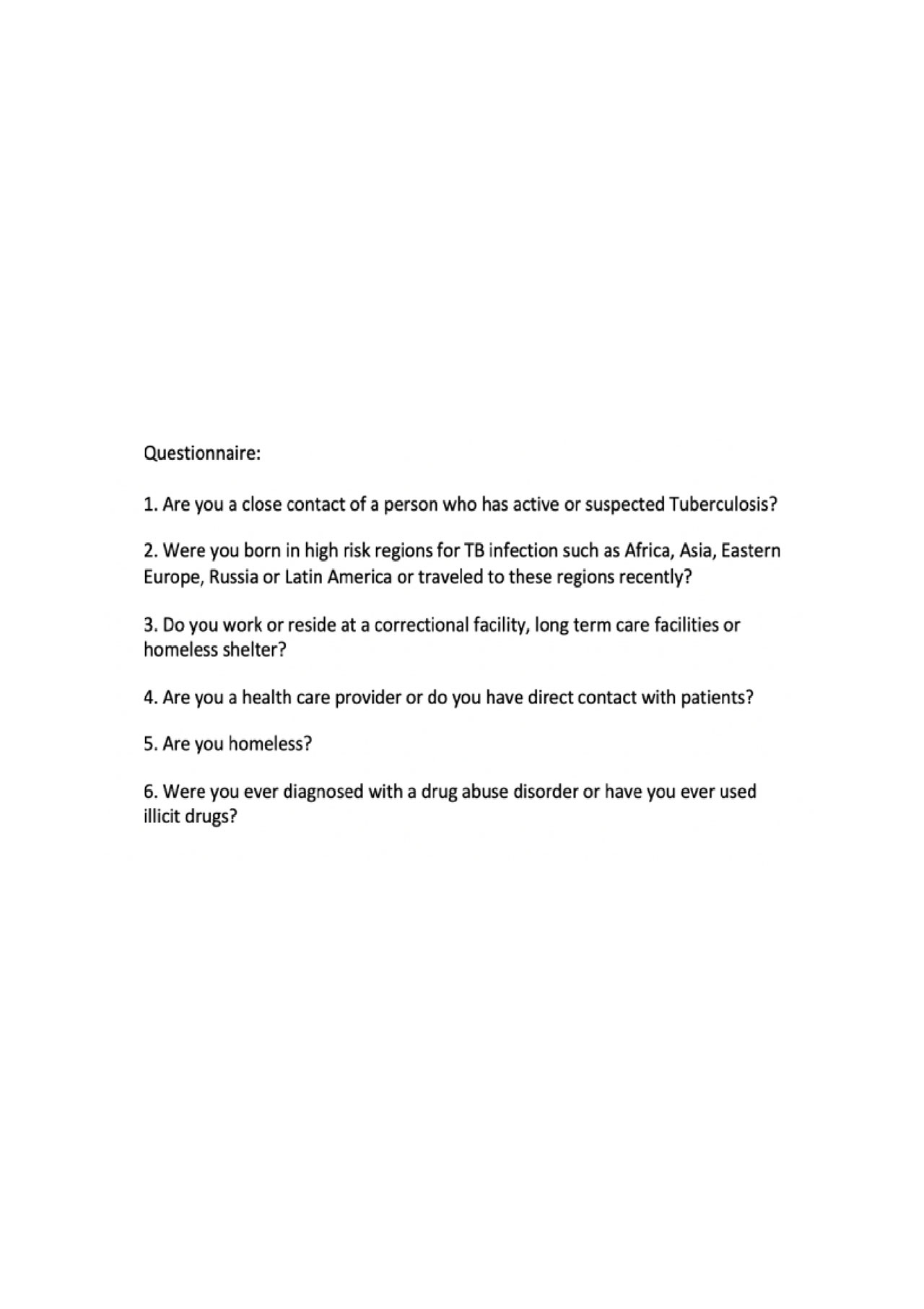Session Information
Date: Sunday, November 10, 2019
Title: Measures Of Healthcare Quality Poster I: Testing, Screening, & Treating
Session Type: Poster Session (Sunday)
Session Time: 9:00AM-11:00AM
Background/Purpose: The use of biologics has transformed the treatment paradigm for RA; however, reactivation of Mycobacterium Tuberculosis is still a concern. Frequent TB screenings without consideration of risk factors can lead to potential clinical dilemmas including indeterminate Interferon-Gamma Release Assays in immunosuppressed patients. Current American College of Rheumatology guidelines recommend annual tuberculosis screening test for high risk patients while on biologics for management of RA. Our goal was to identify the high risk RA patients on biologics (tumor necrosis factor inhibitors, abatacept, IL-6 inhibitors, and tofacitinib)using a guideline based questionnaire and improving the rate of annual Tuberculosis screening among those patients.
Methods: This study was conducted in two large academic centers in Florida and Pennsylvania, which serve a diverse population across multiple clinics. A Plan-Do-Study-Act cycle model was implemented for this project. RA patients chosen for this study were on biologics for more than a year and had a negative baseline interferon-gamma release assay. Chart review was performed to obtain baseline data of how many of these patients were asked high risk questions for Tuberculosis exposure and were screened for Tuberculosis within one year of their visit. Our baseline data was based on one month worth of clinic visits. We put into effect our intervention to improve this rate by educating our Rheumatology providers and creating a questionnaire using American College of Rheumatology guidelines to identify high risk patients (please see attached), which could be easily accessed in our Electronic Medical Record. Post intervention, we gathered data over the course of two months to assess whether there was any improvement in the rate of Tuberculosis screening using the questionnaire.
Results: Our baseline data included 65 patients and postintervention included 175 patients. Analysis of our baseline data revealed that only 4.6% of the time any of the high risk questions were documented in EMR. Post Intervention, our compliance rate using the questionnaire improved to 26.3%. Using the questionnaire we noted an increase in interferon gamma release assay testing from 21 %to 23 % . Moreover, interestingly the rate Tuberculosis conversion to positivity was 0% for all patients in the project.
Conclusion: Our baseline data revealed that we were inadequately identifying high risk patients for Tuberculosis screening. Our post intervention data analysis showed an overall improvement in the rate of appropriate Tuberculosis screening. Despite the slight increase in the percentage of interferon gamma release assays checked in the intervention group, patients were appropriately rescreened based on risk factors. Further intervention such as Electronic Medical Record alerts will be implemented in the future aspects of this study to improve compliance among providers.Given the importance of Tuberculosis screening among high risk patients, we want to raise awareness about this quality measure and work towards providing the highest quality of care to our patients.

Tuberculosis Screening Questionairre
To cite this abstract in AMA style:
Babary H, Afroz S, Carter J, Lin Y, O'Brien M, Maldonado M, Bateman H, Montes-Rivera G, Berlin G, Tseytlin D, MacDonald M, Ayoubi Y, Nguyen M, Setty S, Mhaskar R, Valeriano-Marcet J. Improving the Rate of Tuberculosis Screening Among High Risk Rheumatoid Arthritis Patients on Biologic Agents Using a Proposed Questionnaire [abstract]. Arthritis Rheumatol. 2019; 71 (suppl 10). https://acrabstracts.org/abstract/improving-the-rate-of-tuberculosis-screening-among-high-risk-rheumatoid-arthritis-patients-on-biologic-agents-using-a-proposed-questionnaire/. Accessed .« Back to 2019 ACR/ARP Annual Meeting
ACR Meeting Abstracts - https://acrabstracts.org/abstract/improving-the-rate-of-tuberculosis-screening-among-high-risk-rheumatoid-arthritis-patients-on-biologic-agents-using-a-proposed-questionnaire/
